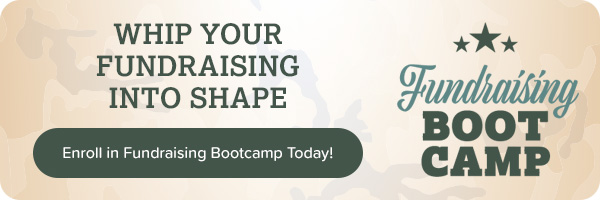When I first saw the word “cultivate” used to describe building relationships with major donors, it annoyed me. To me, the word “cultivate” sounded like something you do with tomatoes or beans, not something you do to real human beings.
The more I thought about it, though, the more the word “cultivate” seemed to describe perfectly the relationship between donor and nonprofit, not just the relationship between a gardener and her latest crop of carrots.
The best gardens produce crops when they’re cultivated by an attentive gardener. Carelessly sown and un-weeded plants don’t produce as well as well-tended ones. It’s the same with major donors. Haphazard relationship-building rarely results in large donations, but careful cultivation of those relationships can. Building relationships with potential major-gifts donors is an art in and of itself (there’s a whole industry of fundraisers dedicated entirely to major gifts!), but there are a few key strategies one should keep in mind:
- Start small.
- Then look inward.
- Be patient! Pay attention!
- Accept that “no” happens.
- Recruit a major gifts expert.
Let’s jump right into the tips!
1. Start small.
Small donors can often be encouraged to increase their gifts to an organization if they have strong ties to the nonprofit itself. Using good donor retention methods and showing appreciation for your supporters are important parts of keeping donors involved.
It’s also important to follow up with donors by asking them to continue their support. There’s a fine line between encouraging your donors to continue their support and coming off as being grabby; don’t treat your donors like ATM machines.
Use your intuition, experience, and familiarity with your donors to decide when to ask for increased support.
2. Then look inward.
If you’ve got an enthusiastic board, you’re in a great position. Ideally, your board should serve as ambassadors for your nonprofit and use their personal networks to build support.
Your board members are lead sources; they spread the word about your nonprofit and stay in contact with people who are interested in offering financial support. Having that groundwork laid by your board members is an invaluable part of the process.
When they’re ready, they can introduce you to their contacts. You can start building the relationship from there!
3. Be patient! Pay attention!
Most major donors are not ready to hand over a check after the first meeting or two. Some of them are, but that’s not the norm! The key to having reliable donors is to build solid relationships, and that takes time.
Knowing when to ask a prospective donor for a donation is an art form. Pay attention to your prospect’s cues, their level of involvement, and the language they use when they talk with you.
Be patient and wait until the perfect moment; that will get the best results. Just don’t wait so long that you forget to actually ask.
4. Accept that “no” happens.
Rejection is the pits, but it happens to everybody at one point or another. Don’t let it get you down!
A prospect turning down a major donation isn’t the end of the world, and it doesn’t have to be the end of your relationship with them. A gracious “thank you” for their time and subsequent invitations to stay involved in the organization (not additional solicitations!) will keep their feelings toward your organization positive, and will show that there are no hard feelings.
A word of wisdom, though; if you’re getting lots of “no” answers and not many positive ones, rethink your major gifts approach!
5. Recruit a major gifts expert.
The last tip is to seek the help of an expert. Hiring an in-house major gift officer will help you stay up-to-date on major fundraising best practices.
From identification to cultivation to solicitation, a major gift officer can help begin relationships with prospects that have the capacity to become major donors. With a dedicated staff member, you can rest assured that they will implement the steps above, plus other strategies to help your organization raise more money.
Not sure how to start your search? Start by writing a detailed job description and promoting your open position on local and nonprofit job boards.
Alternatively, you can hire an executive search consultant to help you manage applications and interviews and craft a strong hiring strategy.
There’s no magic formula to getting major donors, and building the necessary relationships is a lot of work.
If your organization doesn’t have a major gifts officer, consider hiring one to help manage your major gift operations. Just remember to take it slowly, be patient, and emphasize relationships!
For more information about major gifts and other fundraising ideas, check out these additional resources:
- Ultimate Guide to Donor Stewardship. Cultivating long-lasting relationships is key if you want to find major gift donors. Learn more about stewardship and how to build connections with your donors.
- How to Retain Donors During Your Annual Fund. The truth is that your new donors have just as much potential to become major gift donors as your loyal supporters. Learn how you can retain your donors through your nonprofit’s general fundraising initiatives.
- Online Donation Tools. Whether you’re accepting planned gifts, major donations, or first-time contributions, you need a powerful online donation tool to make the giving process quick and simple. Check out our list of top tools to help you raise more money.



